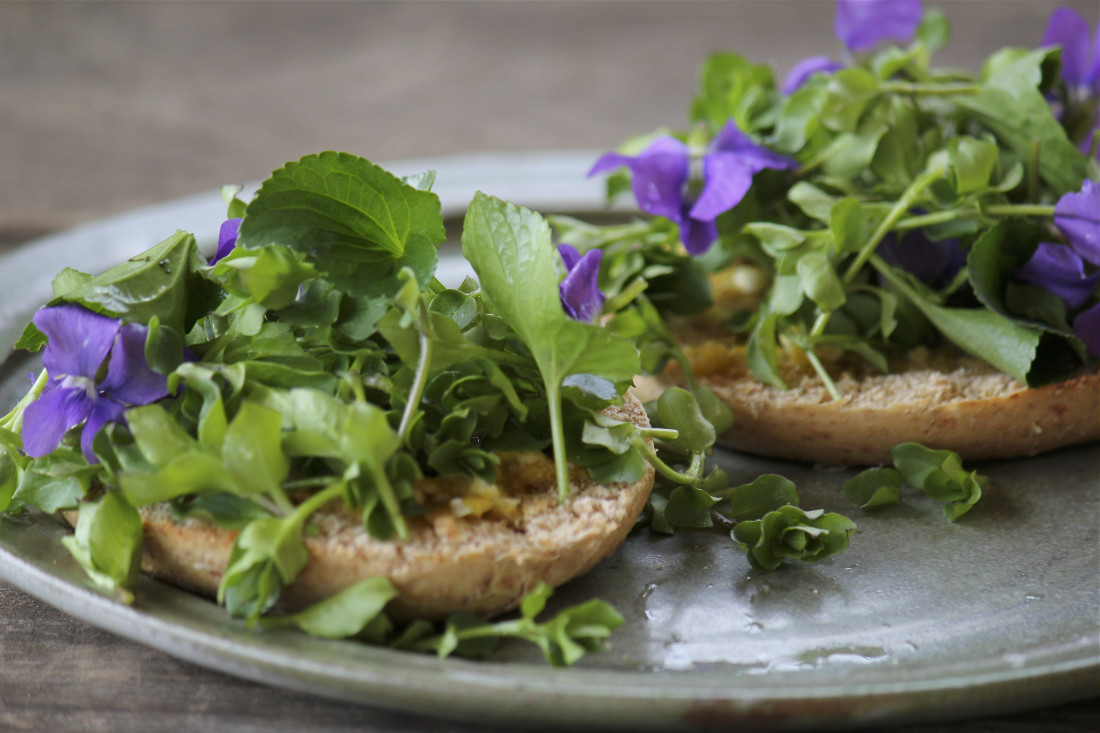Wild foods like dandelion, chickweed and stinging nettle offer a taste of the earth, untouched and uncultivated. They’re what you get when you enter a forager’s or herbalist’s kitchen, where Appalachian folk traditions identify them as both medicinal and key to a diversified daily diet that connects us with the natural cycle of the Earth.
Such foods are as local as you can get — abundant, free and, above all, nutritionally dense foods that can be found close to home or unnoticed at a nearby park or along a trail. Becoming comfortable with these local wild edibles is a simple and safe way to start eating off the land you live on, without becoming a farmer.
One of the best-known weeds, bright yellow dandelions (Taraxacum officinale) burst with color along local highways, open fields and urban lawns. Entirely edible, dandelions bloom in early spring, when our bodies start to detox and shed waste from winter. Not surprisingly, the dandelion leaves, flowers and roots help to assist this process by supporting the liver, purifying the blood and stimulating a healthy digestive system, say local herbalists.
Gathering a handful of dandelion leaves and flowers for a fresh salad or cooking the leaves as a bitter green for part of an evening meal can provide a daily ration of vitamins A, C and K as well as vitamin B-6, fiber calcium and iron. These power plants prefer full sun and seem to relish areas frequented by people. If you live in town and want to harvest dandelion, head to the closest park, such as Carrier Park in West Asheville. You’ll probably find dandelion sprinkled across the park’s flat grassy areas.
Another delicious spring edible, chickweed, prefers to grow in partial shade, blending in and hugging close to the ground. Because it thrives in cool weather, chickweed will be around only until the end of May and early June, and it sometimes returns in the fall. This is another plant you can find in local parks, particularly in the wooded areas or along the edge of fields. You can identify chickweed (Stellaria Media) by its small, white flower, which resembles a star.
The stem, leaves and flowers are edible. Herbalists claim it can be used to soothe inflammation, lose weight and purify the blood. Fresh chickweed is my favorite addition to a spring salad because of its juicy and cooling nature, although you can also cook it lightly for a spinachlike flavor.
For a sensual delight, look to the common purple violet, which also pops up in yellow, blue and white hues. The leaves and flowers are edible, both raw and cooked. The leaves are heart-shaped with a mild mucilaginous texture, while the flowers make a sweet gorgeous garnish for salads or desert.
Violets grow in similar conditions as chickweed. I usually find them growing together, although violets can also thrive in sunnier spots. Currently, violets are blooming in a patch across my entire front yard.
This plant is also rich in nutrients, especially vitamins A and C. In herbal medicine, violet is used to aid metabolic processes and stimulate the flow of the lymphatic system.
Last, but not least, stinging nettle has made brave souls out of foragers and chefs who dare to harvest it. The fine, sharp hairs on the leaves and stems call for wearing gloves while picking. You can find a big patch out at the French Broad River Park off Amboy Road. Local herbalist Juliet Blankenspoor says that this is the peak time to go harvest nettles.
Don’t worry: The nettle’s sting will not make it to your tongue. It dissipates when you cook the plant, leaving a delectable green for your palate. Nettle is rich in vitamins, minerals and proteins and can be used like most cooked greens, such as spinach and kale.
In short, a little education, experience and familiarity with wild foods can dispel our fears and help us rediscover nourishing folk traditions and original uses of local plants. On a holistic level, this is a simple way to diversify our diet and bring intimacy back into our meal preparation. We can reconsider that last-minute run to the grocery store for a head of lettuce to add to dinner and, instead, step into the backyard and find some plants growing there, waiting for you to call them food.
Emily Nichols grew up harvesting plants with her mother and grandmother in Eastern North Carolina. Emily teaches Herbal Medicine and Nature Education programs for summer camps, and she leads wild foods hikes for women in and around Asheville. She is currently studying Herbal Medicine with the Appalachian School of Herbal Medicine and renowned teachers like Ceara Foley, Luke Cannon, Sandi Ford and Melissa Fryer. For more information, contact Emily at emilynicholsphoto@gmail.com.



Before you comment
The comments section is here to provide a platform for civil dialogue on the issues we face together as a local community. Xpress is committed to offering this platform for all voices, but when the tone of the discussion gets nasty or strays off topic, we believe many people choose not to participate. Xpress editors are determined to moderate comments to ensure a constructive interchange is maintained. All comments judged not to be in keeping with the spirit of civil discourse will be removed and repeat violators will be banned. See here for our terms of service. Thank you for being part of this effort to promote respectful discussion.